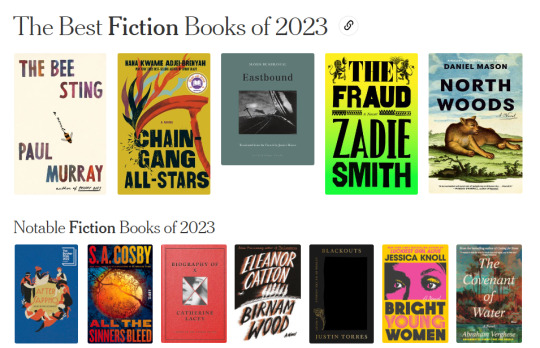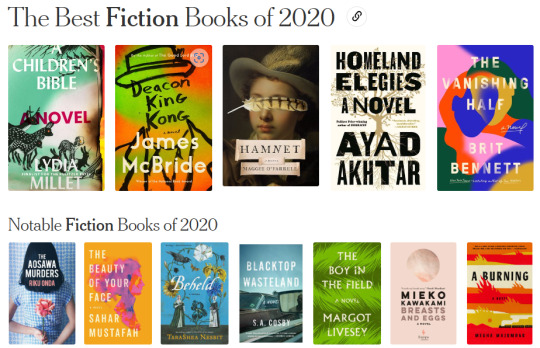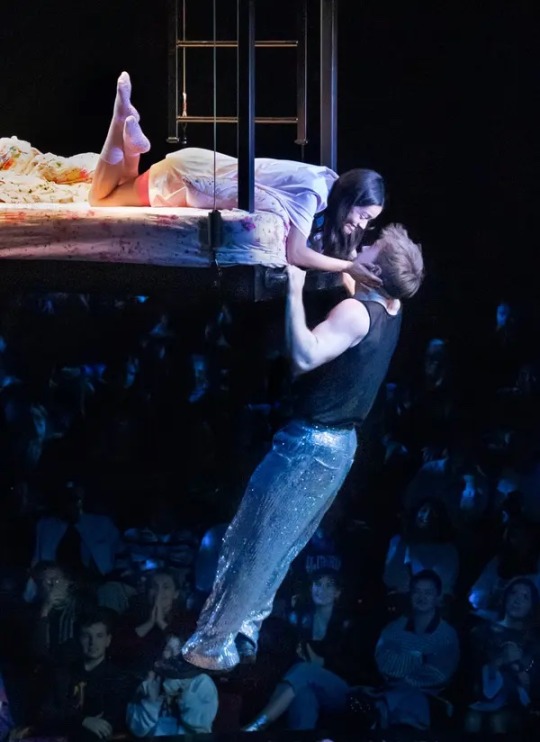#New York Review
Explore tagged Tumblr posts
Text
A Woman Who Wins
It's always a lovely day when you get to read a 4,000+ word review essay of HILD and MENEWOOD in the New York Review of Books! Nicole Rudick had interesting things to say—mostly complimentary. And there's a painted portrait of me in an abbey graveyard...
Algernon the parrot reads “A Woman Who Wins” in NYRB (Photo by Angelique Corthals) It’s always a lovely day when you get to read a 4,000+ word review essay, “A Woman Who Wins,” of Hild and Menewood in the New York Review of Books. For one, it’s been a while since anyone has illustrated me for a print publication (this one was by Leah Reena Goren; the last time was in the Wall Street Journal,…

View On WordPress
3 notes
·
View notes
Text
Secrets are a kind of currency. They can be hoarded, but if kept for too long they lose their value. Like all currencies, they must, sooner or later, be used in a transaction—sold to the highest bidder or bartered as a favor for which another favor will be returned. To see the full scale of Donald Trump’s betrayal of his country, it is necessary to start with this reality. He kept intelligence documents because, at some point, those secrets could be used in a transaction. What he was stockpiling were the materials of treason. He may not have known how and when he would cash in this currency, but there can be little doubt that he was determined to retain the ability to do just that.
Before the publication of the grand jury’s indictment, it was possible to believe that Trump’s retention of classified documents was reckless and stupid. The indictment reveals that recklessness and stupidity are the least of his sins. With Trump, it’s always a mistake to equate anarchy with purposelessness or to think that the farce is not deadly serious. Trump’s hoarding of official secrets is both breathtakingly careless and utterly calculated. At the heart of that calculation is a cold resolve to not give up the power that access to highly restricted information had given him.
The most immediately striking parts of the indictment may, in this regard, be something of a distraction. The photographs that show boxes of papers at Mar-a-Lago, piled high on a ballroom stage, in a bathroom, and spilling out onto the floor of a storage room, convey an almost comic sense of chaos. If comedy is generated by incongruity, what could be more incongruous than nuclear plans or details of “potential vulnerabilities of the United States and its allies to military attack” sitting beside a toilet?
It all seems random and haphazard, an impression greatly magnified by the knowledge that Mar-a-Lago, in the eighteen months after Trump took the documents from the White House, was, as the indictment states, the venue for “more than 150 social events, including weddings, movie premieres and fundraisers that together drew tens of thousands of guests.” The New York Times has published photographs, scraped from social media, of people in party dresses or casual summer clothes around the Mar-a-Lago pool. We can see that, behind them, the door that leads to the storeroom, which was packed with boxes of official papers, is wide open. In those boxes, when the FBI opened them in August 2022, were eleven documents marked Top Secret, thirty-six marked Secret, and twenty-eight marked Confidential. It would have been the least thrilling spy thriller ever made. No James Bond high-tech gadgets or George Smiley ingenuity—just turn up in a cocktail dress, slip through an open door, and help yourself to the US military’s contingency plans for invading Iran.
Yet this ludicrous vulnerability to foreign spies is both remarkable and somewhat beside the point. The slapdash storage of classified papers is shocking—but also misleading. It defines the scandal as, in the words of Alan Feuer and Maggie Haberman in The New York Times, “Mr. Trump’s indifference toward the country’s most sensitive secrets.” But this is not a tale of indifference. Trump cared a great deal about the value of the documents. He cared enough, per the indictment, to suggest that his attorney lie to the FBI and a grand jury about what papers he did or did not have. Even Trump does not engage in a criminal conspiracy purely for its own sake. The retention of those boxes mattered to him because he understood the market value of what they contained.
It is important to bear in mind that chaos is Trump’s natural element. It is the medium in which his narcissism thrives. When there is no plan, the only law is his own desire. He alone knows at any given moment what he will do. In this light, the apparent disorderly storage of the boxes at Mar-a-Lago does not signify a lack of concern with what they contained. It is just the norm of Trumpworld. Derangement is his modus operandi.
The indictment makes clear that Trump knew very well that he was breaking the law. He was repeatedly warned by the National Archives and Records Administration that if he did not hand over the missing records, he would be referred to the Department of Justice. He had, of course, made a very big point in his attacks on Hillary Clinton of the need for zero tolerance for any lack of rigor in the handling of classified documents. He fully understood that the laws applied to everyone, including the president. As he declared in September 2016, before that year’s election, “We can’t have someone in the Oval Office who doesn’t understand the meaning of the word confidential or classified.” As president, in July 2018, he issued a statement saying that “as the head of the executive branch and Commander-in-Chief, I have a unique constitutional responsibility to protect the nation’s classified information, including by controlling access to it.”
More specifically, Trump knew that he was taking huge risks when he allegedly instructed his lawyer to lie to the FBI and the grand jury. That lawyer, quoted in the indictment, recalls that when Trump told him to take a folder of documents to his hotel room, he made a silent “plucking motion,” as if to say, “if there’s anything really bad in there, like, you know, pluck it out.” Precisely because Trump knew that he was committing a crime, he preferred not to utter the incriminating words. There is nothing thoughtless or accidental in all of this. He clearly believed that the risks were worth taking.
This does not suggest that he was holding these documents merely as souvenirs. It’s quite possible to believe that part of his motivation lay in his fantasy that he was still the real president: retaining the intelligence briefings he received as POTUS would make him still, at some level of self-delusion, potent. The two known occasions, cited in the indictment, when Trump produced some of the documents to outsiders while explicitly referring to them as secret and confidential have this air of showing off—perhaps as much to himself as to those he was trying to impress. It is also quite reasonable to think of him experiencing a tingle of pure pleasure in imagining his own impunity—knowing that he was committing the ultimate transgression and thrilling to the idea that he would get away with it because he had always in his life gotten away with everything.
But these elements of twisted psychology can coexist with a more rational impulse: to keep hold of secrets that could be traded at some point for his personal gain. Trump sees himself above all as a deal-maker: “The nation’s classified information” is a potentially lucrative part of one or many deals.
This intent would be treasonous. Trump may not have actually committed treason, but he was consciously putting himself in a position to be able to do so. For what is not secret is the identity of the foreign countries that would be most interested in acquiring the details of the military plans and vulnerabilities of the US and its allies. The indictment states that the documents also included information that could identify US agents and informants in some of those countries and “the continued viability of sensitive intelligence collection methods.” This is worth underlining: Trump went to great lengths to retain for himself, as a private citizen, the power to reveal to any foreign power not just US military secrets but the workings of US intelligence-gathering in those countries. It is impossible to believe that he did this accidentally or without considering that he might at some time use that power in return for some financial or other benefits.
Which makes it all the more astonishing that most of the Republican Party is fine with this. Much of the history of the right in America is bound up with paranoia about the possible existence of traitors at high levels of government. Here is stark evidence of the existence of one at the very highest level of government, and Republicans are rushing to defend him. The Elizabethan courtier Sir John Harington famously asked, “Treason doth never prosper: what’s the reason?” and answered, “For if it prosper, none dare call it Treason.” If the hoarding of state secrets as valuable currency cannot be called treason, the concept has gone the way of honor, truthfulness, and respect for law. It has ceased to exist for the Republican Party.
[The New York Review]
Fintan O’Toole
Fintan O’Toole is the Advising Editor at The New York Review, a columnist for The Irish Times, and the Leonard L. Milberg Professor of Irish Letters at Princeton. His most recent book, We Don’t Know Ourselves: A Personal History of Modern Ireland, was published in the US last year. (June 2023)
5 notes
·
View notes
Text




According to the New York Times, these are the best fiction books of the 2020s. Do you agree? What's missing?
550 notes
·
View notes
Text


some recent purchases | i've been really into translated fiction this year, so i decided to add a couple more to my tbr!!
#autumn 🍂#haul#book haul#literature aesthetics#books#bookish#book#bookblr#bookworm#bookstagram#dark academia#booklover#books and libraries#classics#dark acadamia aesthetic#nyrb#new york review books#lipgloss#makeup#aesthetic#photo diary#photo diaries#cozy#study space#study hard#studying#studyblr#study motivation#study#productivity
223 notes
·
View notes
Text

The New York Review of Books - The Art Issue - 9 May 2024
46 notes
·
View notes
Text
youtube
#youtube#redlettermedia#red letter media#rich evans#jay bauman#gorilla interrupted#half in the bag#mike stoklasa#best of the worst#jack packard#borderlands#movies#movie#movie review#movie reviews#medical#mp3#bad movie#music#makeup#menswear#my art#mine#tumblr milestone#my post#new york#nerd#new#night#news
107 notes
·
View notes
Text


This 1970s short story is about a black shelled lonely crab alien contending with human romance. I'm sure my enjoyment of it has no other factors...
(The Reality Trip by Robert Silverberg— i love my pulp short story collections, overall collection is quite eh so far, this story was a lot of fun, and then whoops, there's a sudden very racist one! I read a collection by Theodore Sturgeon before this so I'm still haunted by how much better he is than Silverberg at every turn.)
#i will do a lil review for it when im done#the racism part: yikes! we talked about it in my discord and i posted text examples which were Shocking#it is one of those. silverberg is a jewish author from new york trying to do social commentary with some satire. however#he chose to do this about the civil rights movement and black people from a very limited pov of a black teen in AAVE and with slurs#yes buddy i can tell what you thought you were doing i think but what the fuck made you think YOU should write this#there is. so much really uncomfortable cultural exaggeration going on. extremely gross hypersexualization of black women. a bi#a bizarre choice to interlace it with various real quotes from black civil rights leaders that have no story relevence#i had a bad feeling the moment the inside blurb said 'a weird and wonderful' take on racial politics in the 21st century#its sad bc the crab one is kinda a banger in terms of comedy alien pov. tries to scare away human by showing trye form. shes 100% down#even has gay crab sex to make her jealous and shes like. “can i date both of you. can i join.”
41 notes
·
View notes
Text
The New York Times Review:
The Broadway revival of “Romeo + Juliet” plays to the TikTok crowd. But maybe that’s a good thing.
Source: New York Times Oct 24, 2024 (X)
Mostly positive, which is impressive from the NYT! Hopefully offsets the negative reviews. (X)

Kit Connor and Rachel Zegler and a viral pull-up
…Connor needs no help in keeping and maintaining the emotional temperature, easily enlarging the tenderness and obliviousness of his Nick on “Heartstopper” to fit the stage. When he looks into Juliet’s eyes, you see what he wants and how seriously he wants it; when he walks among his riotous peers, as they hump Teddy bears and sniff out insults, you see how little that means to him now.
Connor is also a very physical actor, or at any rate his recently beefed-up, often tank-topped body is given a workout. Instead of just climbing to Juliet’s balcony — represented by the design collective dots as a flowery bed that descends from the heavens — he does a leaping pull-up from the ground to get there, then lifts himself farther to achieve full face time. This is a lover with lats.

But a manly Romeo and a tiny Juliet — Connor is nearly a foot taller than Zegler — creates, or reinforces, a problem. It’s disturbing enough in the Shakespeare when Lady Capulet tells her 13-year-old daughter that “ladies of esteem” her age are “already made mothers.” With an actor who, despite his baby face, looks much older than his years (Connor is 20) and an actress who looks much younger than hers (Zegler is 23) you’re left in an indeterminate space between ancient and current levels of ick.
It’s wise, then, that despite the supercharged sexuality of the staging otherwise, Gold limits the pair’s lovemaking to gropes and kisses.
…Gold’s staging is perhaps the busiest and funniest I’ve seen, a lot of the humor coming from the dotty nurse, whom Shakespeare designed for that purpose. (She is played with Valley Girl snark by Tommy Dorfman, who also plays Tybalt.) And though there is, of course, violence, it is broadly mimed and deliberately mild. What the production emphasizes instead is unfairness, as teenagers tend to do as well, wanting limits to excuse their whining.

The play is thus less terrifying than teenifying — hence the plus sign instead of the “and” in the title. The lobby, lit like a junior high school prom, offers not just the expected merch and specialty mocktails but a table where ticket holders can learn about registering to vote. The choreography by Sonya Tayeh lands perfectly in the zone between professional movement and what a nerd might do in front of a mirror. Fangirling and fanboying are strongly encouraged. There is nothing unlikable about any of this.
It’s a little slick, though, at least for seen-that adults. The play’s twisty language, expressive of twisty thoughts, is largely untangled but, in the process, flattened. (Gold’s edit brings the running time, not counting intermission, to “the two hours’ traffic of the stage” Shakespeare mentions, but some of that traffic is stop-and-go.) I smiled a lot but never came close to crying.
Is that a reasonable response to aim for when staging the world’s most famous weepie? For me, seeing so many young people engaged, it is. Perhaps, as Shakespeare commands in the play’s closing speech, they will “Go hence, to have more talk of these sad things.” And so what if the production achieves that goal by protecting them from too much unruly feeling, just as the Capulets aimed to protect Juliet? Probably, the Capulets were right.

#kit connor#New York times review of Romeo + Juliet on Broadway#romeo + juliet#romeo + juliet on broadway#romeo + juliet broadway#New York Times review#romeo + juliet broadway review#new york times#romeo and juliet on broadway#New York times theater review#heartstopper#nick nelson
48 notes
·
View notes
Text

mhemusical: My first five-star review for a musical this season. See this show! It’s enchanting.” - @FeldmanAdam, @TimeOutNewYork
📷 @MurphyMade @evanzimm
#darren criss#mhe reviews#feldman adam#time out new york#maybe happy ending#maybe happy ending bway#tweets about darren#nov 2024
34 notes
·
View notes
Text
23 notes
·
View notes
Text

"I feel so guilty enjoying it after what Brooks Atkinson said."
Cartoon by Perry Barlow for the November 15, 1941 issue of The New Yorker. Brooks Atkinson was the theater critic of the New York Times and, even in those days when there were many more newspapers than there are now, the most powerful.
Photo: Condé Nast Store
#vintage New York#1940s#Perry Barlow#cartoon#vintage cartoon#The New Yorker#Brooks Atkinson#theater review#theater#vintage Broadway#theater criticism#1940s NYC#NY Times
19 notes
·
View notes
Note
Hello GT, I absolutely love Lionheart!
I published my first fic and have been dealing with some criticism; it’s not anythjng super hateful, but it’s not anything meant to make me improve either. I’ve been feeling sort of down because of it. My question is: have you ever dealt with hate or criticism before? What is your attitude towards it?
I find your work and answers on here super insightful and inspiring! I hope you have a nice day ❤️
Fuck em. Like, seriously, just fuck em. There's a time and place for writers to take critique and be strict with themselves; it's necessary for any artist to grow. That place is with a chosen group of creatives whose work you admire and whose judgment you trust. A rando on the Internet, while they may in fact be the next Marcel Proust, probably isn't. And I was raised to believe that while it's appropriate and kind to pay compliments to strangers when they're performing — just as you'd smile at a busker on the sidewalk, and or compliment a chalk artist — it's not appropriate to criticize them when what they do isn't to your tastes. They're providing you with their art for free. No one forced you to read it; no one forced you to listen. If you don't like it, it costs $0 to shut the fuck up.
Also — that thing I said about artists taking critique? That assumes that you're doing this out of a desire to improve your writing, which, while noble, is not actually a thing you need to do if you're a hobby writer. I like trying to improve; it makes me feel good. But at the end of the day, I do this for fun. I do this because in my real job, I am ruthless and self-critical and try really fucking hard to do well, and you need parts of your life that Aren't Like that. You need parts of your life where you're not worrying about whether you're Doing It Right. And living without that anxiety of critique is, paradoxically, the only way you'll find the artistic courage to take risks and develop new skills. Everyone is a little bit rough around the edges to begin with. (Not saying you're a beginner — you merely said "publish," and I certainly wrote a lot of things before I started publishing! But every artist is always trying to develop new skills and techniques; in the grand scope of things, we're all beginners.) Giving someone blunt critique when they're in the beginning phases of their journey as an artist is about as helpful as screaming at your six-year-old kid because he can't swim the butterfly.
And the thing is, these people will bluster and say "well, I'm just being honest, I'm just trying to be helpful," but like: mmmmmmno, you're not! You're not. And it's disingenuous to say so. Because if you were actually trying to be helpful, you would introduce yourself, offer your skills as an editor/beta reader, and start building the relationship of trust that grounds any meaningful co-creative partnership. People do not just accept random critique that comes flying at them from the blue nowhere. And issuing it in that form is the best way to make them hostile, defensive, and unreceptive to it. Delivering harsh feedback without a context of care and support is almost sure to fail as a method of actually changing behavior, and either (1) you know that, and are doing it anyway — presumably because you want people to know how Terribly Clever and Better At Writing you are, or (2) you sincerely have never thought about the effect that context and word choice have on how other people receive your meaning.
Which tells me you are the last fucking person on the planet I want writing advice from.
#basically: fuck them and fuck anyone who doesn't come to you with kindness when they're offering critique#i don't care if they're a nobel prizewinner. no one is above offering kindness#and if someone thinks they're above giving kindness then you should view them with derision and pity#imagine being so sad you spend your free time shitting on other people's art.#like you're not a critic. you're not the new york times book review buddy.#you read something that someone put their whole heart and joy and free time into#and then held out in their hands eagerly to share with you. because they thought you might like it.#and you sneered at them.#Anon I think you should keep writing forever. I think that the merest sentence you have ever written#is worth more than anything that the authors of your criticism could conceive#and it's you. it's you! if it brings you joy then it's fulfilled its purpose#people mean more than art. you mean more than art. your satisfaction is the object of making it#and finally THANK YOU so much for your very kind words.#they mean a tremendous amount and i am grateful for them.
26 notes
·
View notes
Text

Official Stick Reviews | Lindsay D'Addato | New York Times
44 notes
·
View notes
Text

#youtube#redlettermedia#red letter media#rich evans#jay bauman#gorilla interrupted#half in the bag#mike stoklasa#best of the worst#jack packard#roll#movie review#punk rock#room#reddit#robots#long reads#lana del rey#rambles#oc rp#honkai star rail#romance#new year#yoda#yeah#new york#thank you#older man younger woman#yandere#y2k
25 notes
·
View notes
Text
My new favorite review has changed. It is now that person who said I had stolen small town valor because I wrote that there was a bus that came to the edge of town every half hour.
It is my favorite review because they are correct and its also very funny and also my city slicker status being unveiled due to muncipal failure via public transportation availability is so hysterical. whoever wrote that review i love you and also you are right, I am from chicago and am a small town Visiter, not native, also thank you for forgiving me for that
I cannot wait until Hollis comes out and someone catches me in a seasonally inappropriate crop-mention guestimation. I love my fans and I love being from the midwest.
#i cant believe i let that slip through the cracks#thats honestly what I get for having 1000 editors from new york city#I need another midwest princess to beta my work#I exclusively like 3 star reviews and down because they are so flavorful tbh
17 notes
·
View notes
Text
file under: me trying to sound smart
So many theatre critics missing the point: Romeo + Juliet’s superpower is in the audience they’re speaking to


Kit Connor and Rachel Zegler as Romeo and Juliet. Image source: @experienceandobservation (X)
Playbill’s notice for Romeo + Juliet reports that the director was quite purposefully speaking to young people with this Broadway revival:
Director Gold said in a statement, “With the presidential election coming up in November, I felt like making a show this fall that celebrates youth and hope, and unleashes the anger young people feel about the world they are inheriting."

Image source: Wall Street Journal’s review (X)
At least the New York Times gets it:
The reconsidered tone of this Shakespeare adaptation, aimed squarely at the young people who packed the house, was praised by the New York Times theatre critic as worthy. Thankfully that’s an incredibly influential theatre critic from one of the most important publications for Broadway reviews.
In stark contrast, the New York Post and Variety theatre critics couldn’t see past the past. They appeared to want a traditional take on the Bard’s most tragic love story, which completely misses the point.
#kit connor#romeo + juliet#romeo + juliet broadway review#romeo + juliet on broadway#romeo + juliet broadway#romeo and juliet on broadway#romeo & juliet#romeo and juliet#mine#pin#pinned#review#new york times#Broadway review#new york post#variety magazine
21 notes
·
View notes